Application of Hofstede's Cultural Model in Deloitte Consulting Company
VerifiedAdded on 2023/06/14
|12
|1754
|418
AI Summary
This article discusses the application of Hofstede's cultural model in Deloitte Consulting Company and the challenges it faces in Brazil, Japan, and Germany. It highlights the importance of cultural barriers in international business and the need to adapt to local customs and practices. The article also emphasizes the significance of understanding regional and sub-cultural differences and identifying new opportunities in foreign markets.
Contribute Materials
Your contribution can guide someone’s learning journey. Share your
documents today.

International
Management
Management
Secure Best Marks with AI Grader
Need help grading? Try our AI Grader for instant feedback on your assignments.

Table of Contents
Part 1 Assignment (Task 1a)...............................................................................................................3
Task 1b- Reflection............................................................................................................................10
References..........................................................................................................................................12
Part 1 Assignment (Task 1a)...............................................................................................................3
Task 1b- Reflection............................................................................................................................10
References..........................................................................................................................................12
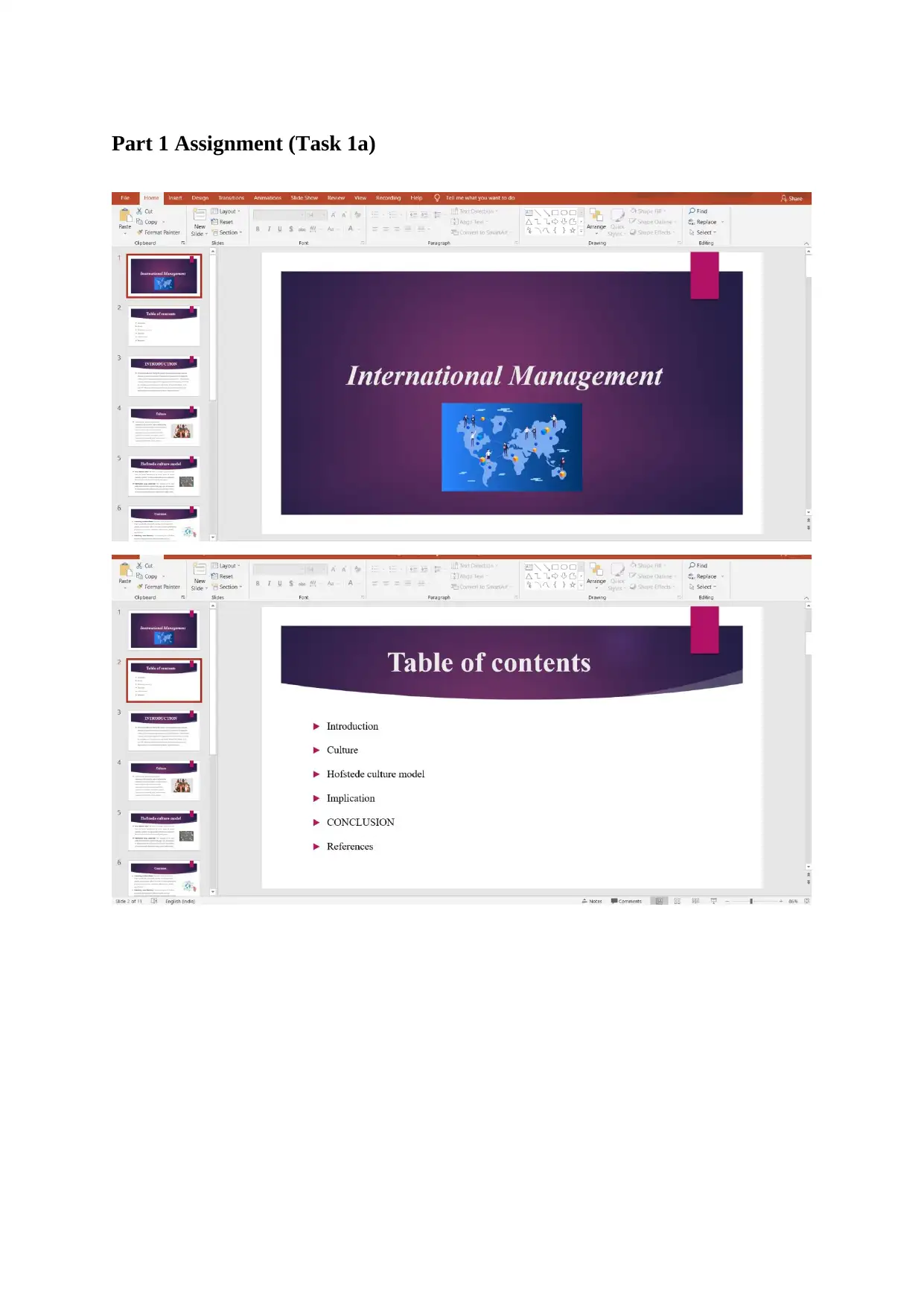
Part 1 Assignment (Task 1a)
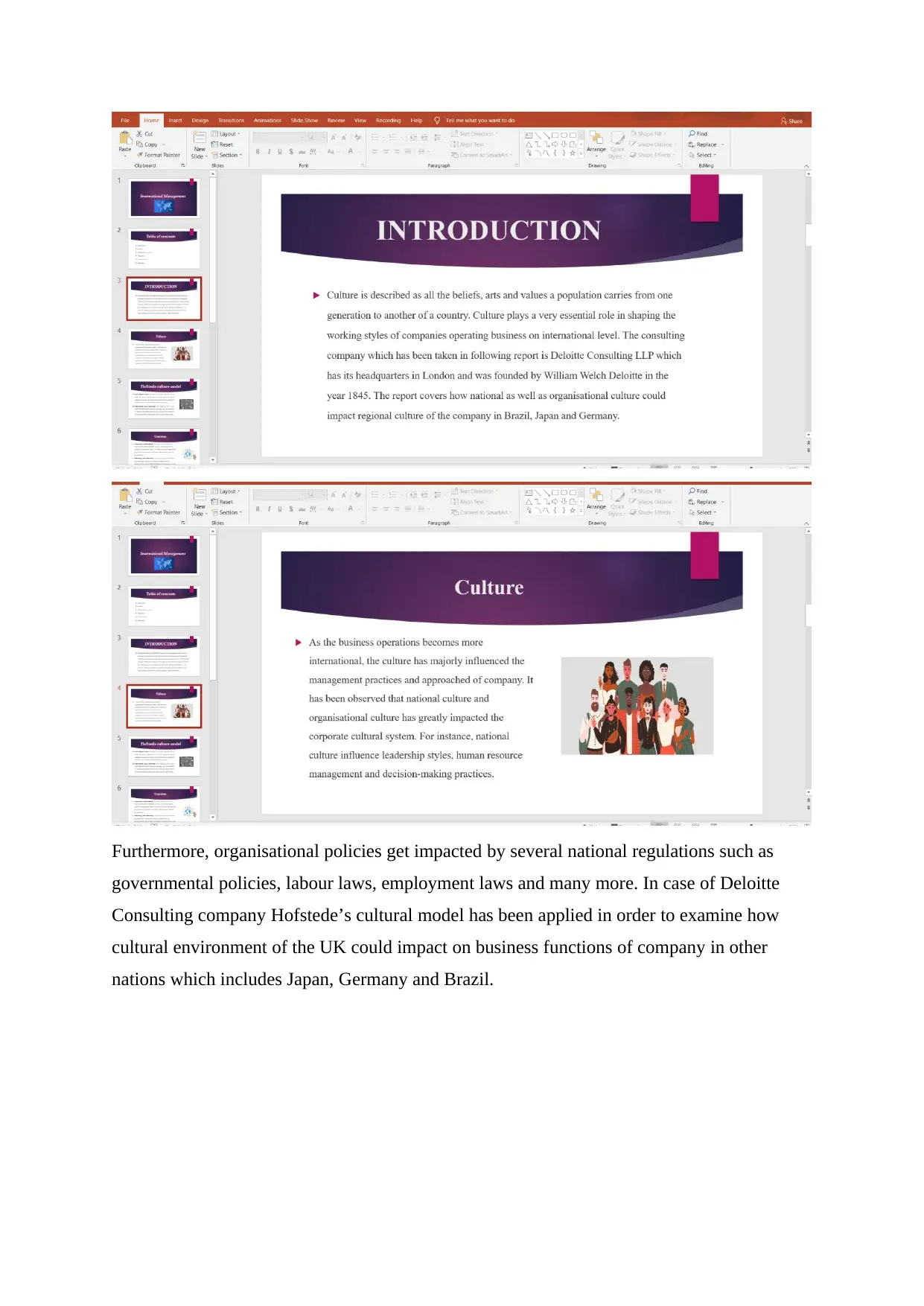
Furthermore, organisational policies get impacted by several national regulations such as
governmental policies, labour laws, employment laws and many more. In case of Deloitte
Consulting company Hofstede’s cultural model has been applied in order to examine how
cultural environment of the UK could impact on business functions of company in other
nations which includes Japan, Germany and Brazil.
governmental policies, labour laws, employment laws and many more. In case of Deloitte
Consulting company Hofstede’s cultural model has been applied in order to examine how
cultural environment of the UK could impact on business functions of company in other
nations which includes Japan, Germany and Brazil.
Secure Best Marks with AI Grader
Need help grading? Try our AI Grader for instant feedback on your assignments.
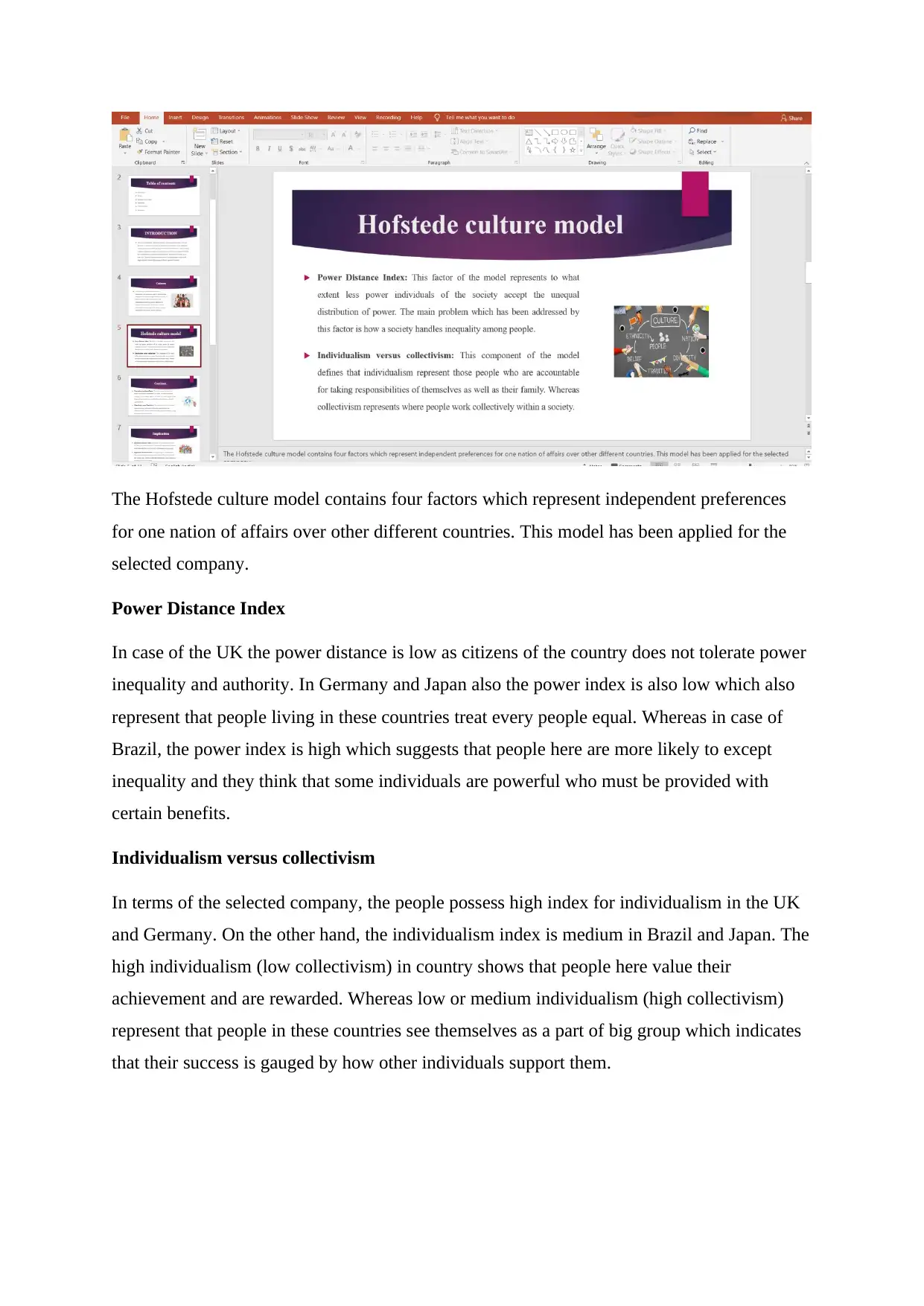
The Hofstede culture model contains four factors which represent independent preferences
for one nation of affairs over other different countries. This model has been applied for the
selected company.
Power Distance Index
In case of the UK the power distance is low as citizens of the country does not tolerate power
inequality and authority. In Germany and Japan also the power index is also low which also
represent that people living in these countries treat every people equal. Whereas in case of
Brazil, the power index is high which suggests that people here are more likely to except
inequality and they think that some individuals are powerful who must be provided with
certain benefits.
Individualism versus collectivism
In terms of the selected company, the people possess high index for individualism in the UK
and Germany. On the other hand, the individualism index is medium in Brazil and Japan. The
high individualism (low collectivism) in country shows that people here value their
achievement and are rewarded. Whereas low or medium individualism (high collectivism)
represent that people in these countries see themselves as a part of big group which indicates
that their success is gauged by how other individuals support them.
for one nation of affairs over other different countries. This model has been applied for the
selected company.
Power Distance Index
In case of the UK the power distance is low as citizens of the country does not tolerate power
inequality and authority. In Germany and Japan also the power index is also low which also
represent that people living in these countries treat every people equal. Whereas in case of
Brazil, the power index is high which suggests that people here are more likely to except
inequality and they think that some individuals are powerful who must be provided with
certain benefits.
Individualism versus collectivism
In terms of the selected company, the people possess high index for individualism in the UK
and Germany. On the other hand, the individualism index is medium in Brazil and Japan. The
high individualism (low collectivism) in country shows that people here value their
achievement and are rewarded. Whereas low or medium individualism (high collectivism)
represent that people in these countries see themselves as a part of big group which indicates
that their success is gauged by how other individuals support them.
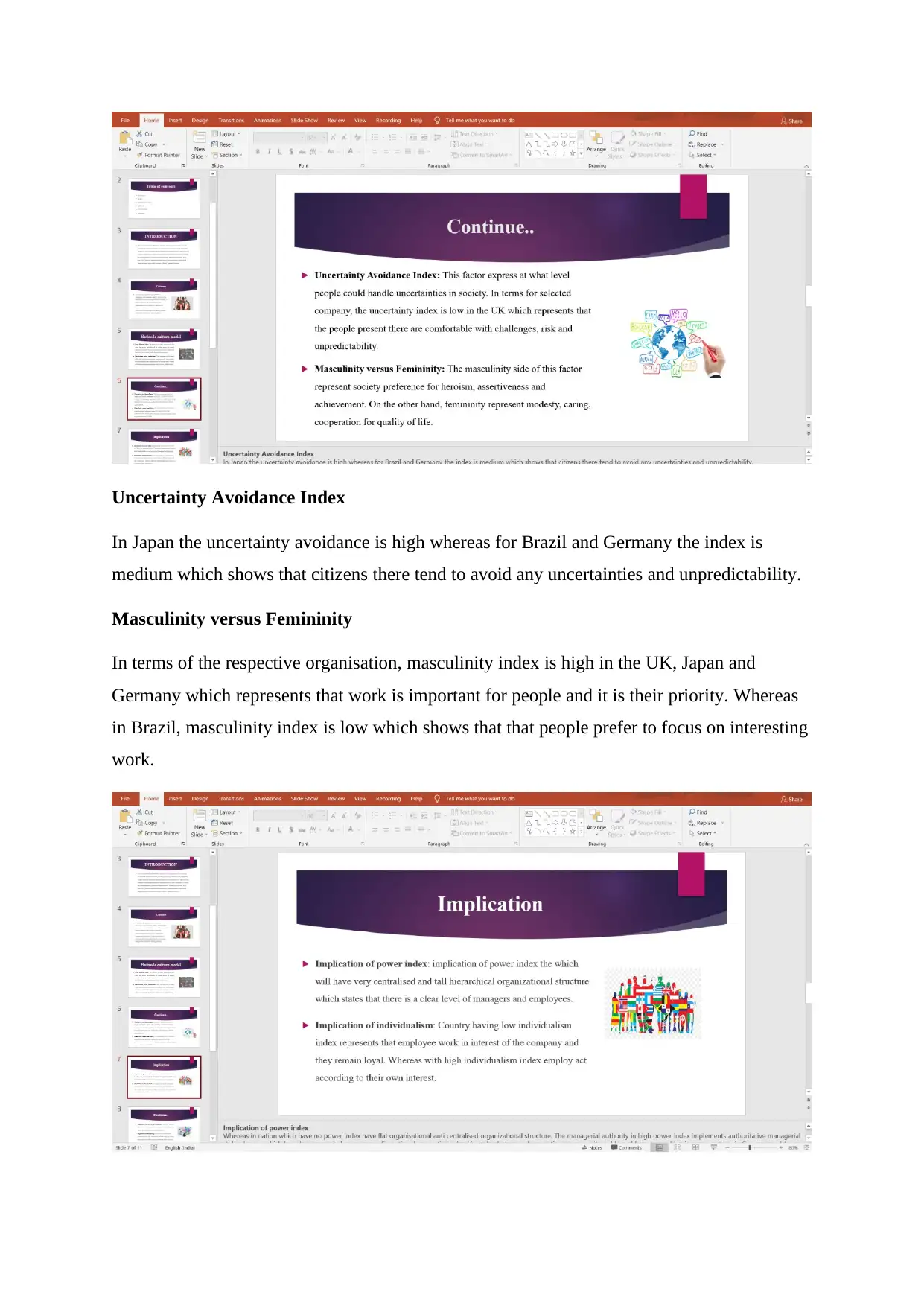
Uncertainty Avoidance Index
In Japan the uncertainty avoidance is high whereas for Brazil and Germany the index is
medium which shows that citizens there tend to avoid any uncertainties and unpredictability.
Masculinity versus Femininity
In terms of the respective organisation, masculinity index is high in the UK, Japan and
Germany which represents that work is important for people and it is their priority. Whereas
in Brazil, masculinity index is low which shows that that people prefer to focus on interesting
work.
In Japan the uncertainty avoidance is high whereas for Brazil and Germany the index is
medium which shows that citizens there tend to avoid any uncertainties and unpredictability.
Masculinity versus Femininity
In terms of the respective organisation, masculinity index is high in the UK, Japan and
Germany which represents that work is important for people and it is their priority. Whereas
in Brazil, masculinity index is low which shows that that people prefer to focus on interesting
work.
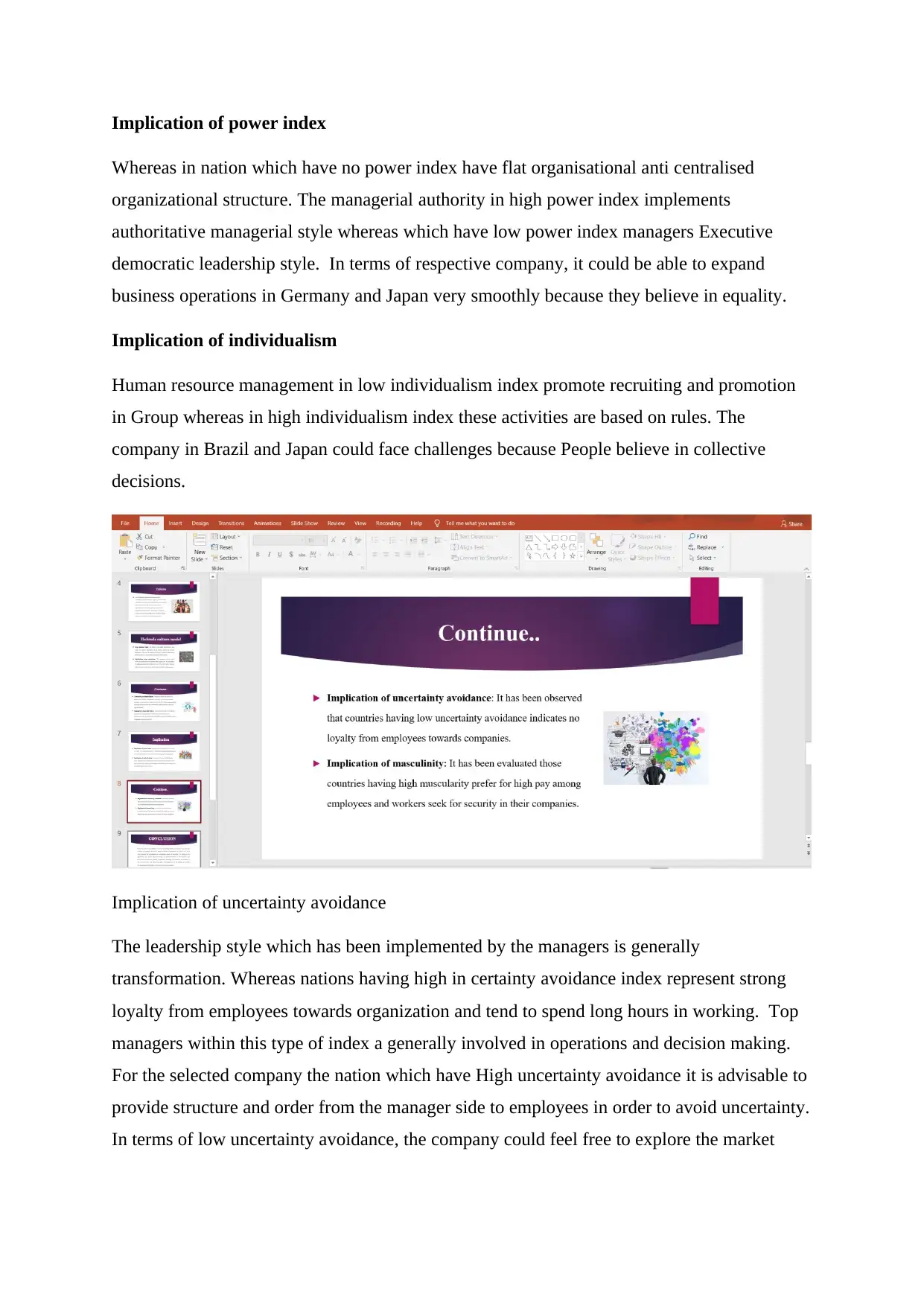
Implication of power index
Whereas in nation which have no power index have flat organisational anti centralised
organizational structure. The managerial authority in high power index implements
authoritative managerial style whereas which have low power index managers Executive
democratic leadership style. In terms of respective company, it could be able to expand
business operations in Germany and Japan very smoothly because they believe in equality.
Implication of individualism
Human resource management in low individualism index promote recruiting and promotion
in Group whereas in high individualism index these activities are based on rules. The
company in Brazil and Japan could face challenges because People believe in collective
decisions.
Implication of uncertainty avoidance
The leadership style which has been implemented by the managers is generally
transformation. Whereas nations having high in certainty avoidance index represent strong
loyalty from employees towards organization and tend to spend long hours in working. Top
managers within this type of index a generally involved in operations and decision making.
For the selected company the nation which have High uncertainty avoidance it is advisable to
provide structure and order from the manager side to employees in order to avoid uncertainty.
In terms of low uncertainty avoidance, the company could feel free to explore the market
Whereas in nation which have no power index have flat organisational anti centralised
organizational structure. The managerial authority in high power index implements
authoritative managerial style whereas which have low power index managers Executive
democratic leadership style. In terms of respective company, it could be able to expand
business operations in Germany and Japan very smoothly because they believe in equality.
Implication of individualism
Human resource management in low individualism index promote recruiting and promotion
in Group whereas in high individualism index these activities are based on rules. The
company in Brazil and Japan could face challenges because People believe in collective
decisions.
Implication of uncertainty avoidance
The leadership style which has been implemented by the managers is generally
transformation. Whereas nations having high in certainty avoidance index represent strong
loyalty from employees towards organization and tend to spend long hours in working. Top
managers within this type of index a generally involved in operations and decision making.
For the selected company the nation which have High uncertainty avoidance it is advisable to
provide structure and order from the manager side to employees in order to avoid uncertainty.
In terms of low uncertainty avoidance, the company could feel free to explore the market
Paraphrase This Document
Need a fresh take? Get an instant paraphrase of this document with our AI Paraphraser
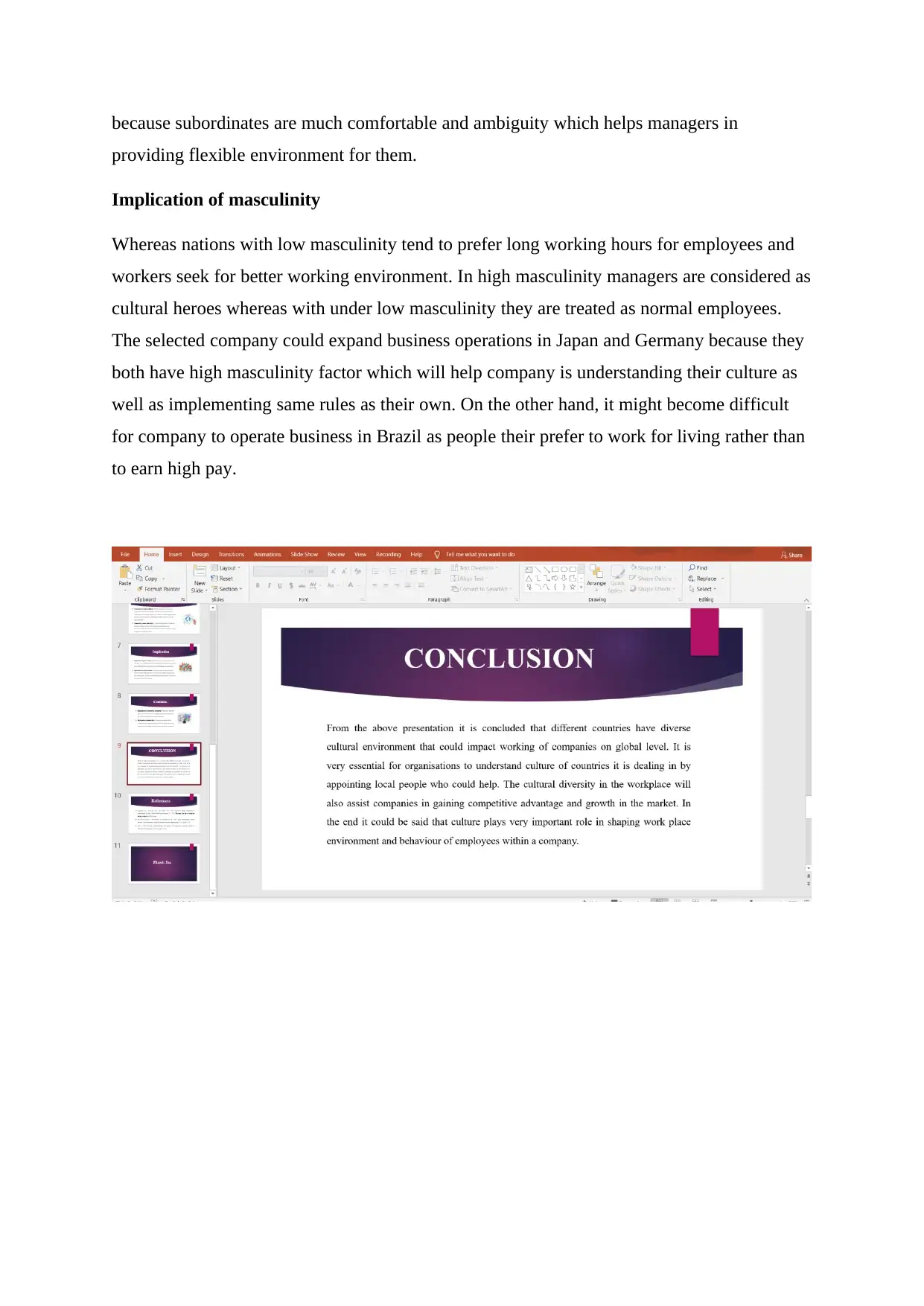
because subordinates are much comfortable and ambiguity which helps managers in
providing flexible environment for them.
Implication of masculinity
Whereas nations with low masculinity tend to prefer long working hours for employees and
workers seek for better working environment. In high masculinity managers are considered as
cultural heroes whereas with under low masculinity they are treated as normal employees.
The selected company could expand business operations in Japan and Germany because they
both have high masculinity factor which will help company is understanding their culture as
well as implementing same rules as their own. On the other hand, it might become difficult
for company to operate business in Brazil as people their prefer to work for living rather than
to earn high pay.
providing flexible environment for them.
Implication of masculinity
Whereas nations with low masculinity tend to prefer long working hours for employees and
workers seek for better working environment. In high masculinity managers are considered as
cultural heroes whereas with under low masculinity they are treated as normal employees.
The selected company could expand business operations in Japan and Germany because they
both have high masculinity factor which will help company is understanding their culture as
well as implementing same rules as their own. On the other hand, it might become difficult
for company to operate business in Brazil as people their prefer to work for living rather than
to earn high pay.
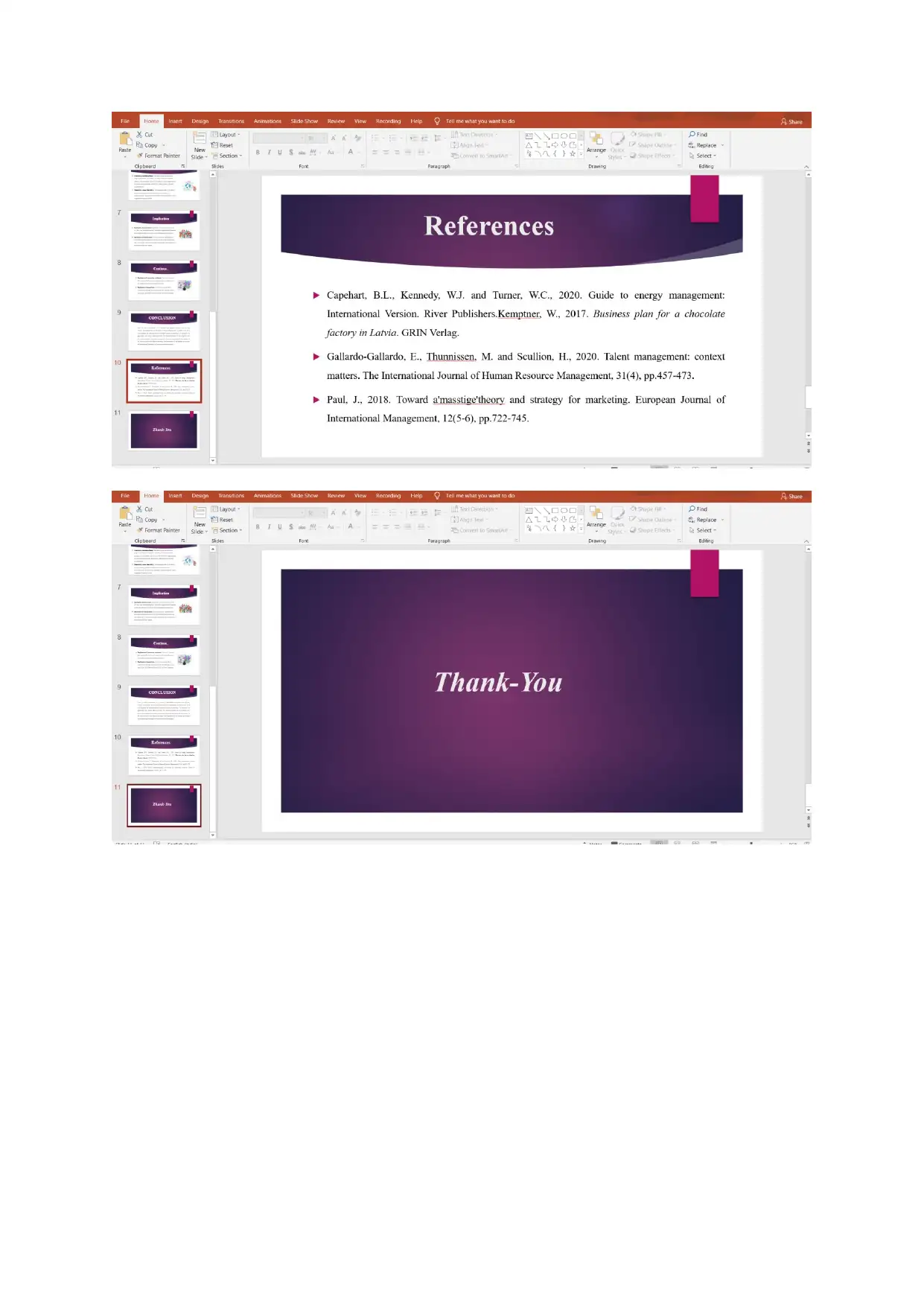
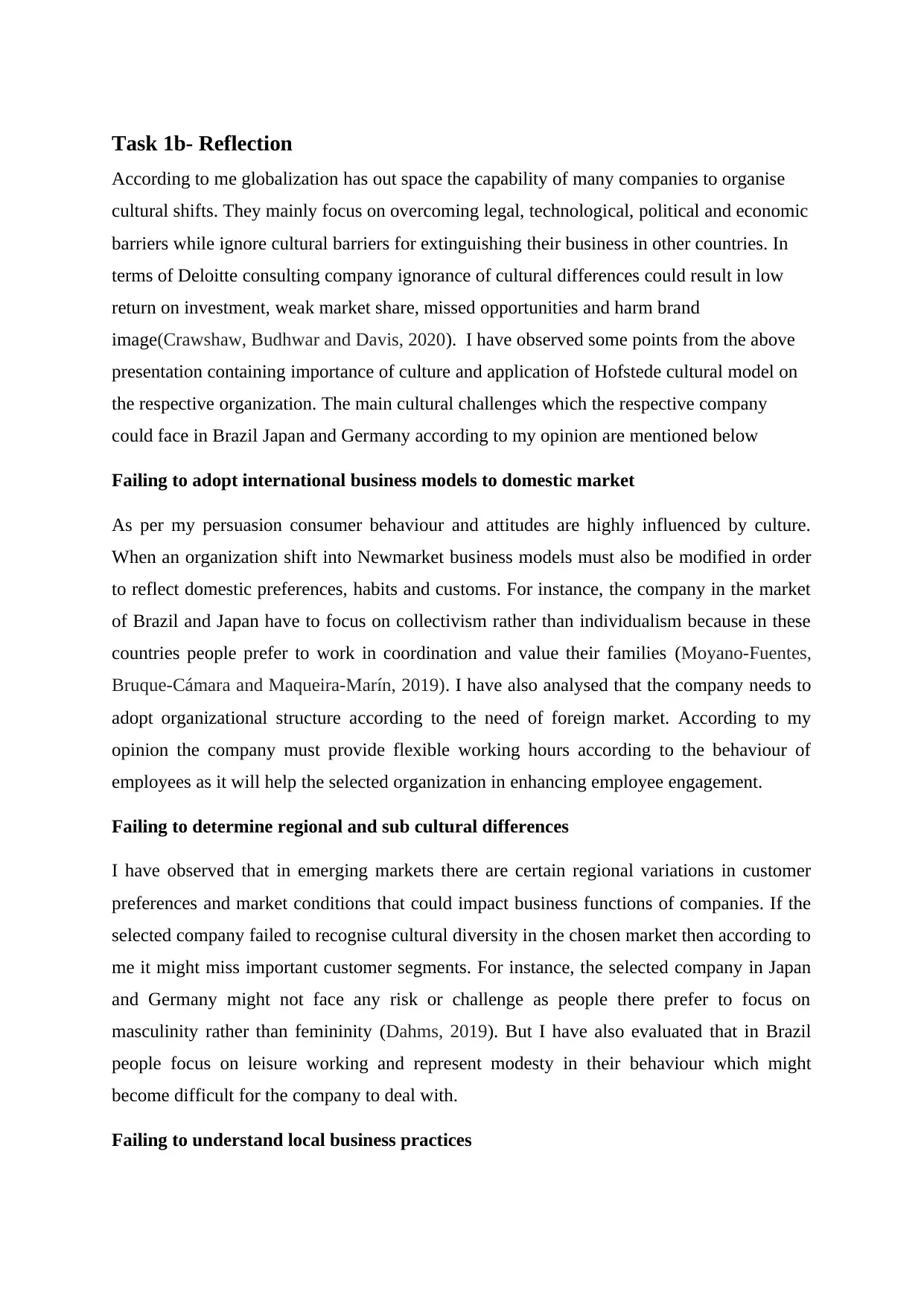
Task 1b- Reflection
According to me globalization has out space the capability of many companies to organise
cultural shifts. They mainly focus on overcoming legal, technological, political and economic
barriers while ignore cultural barriers for extinguishing their business in other countries. In
terms of Deloitte consulting company ignorance of cultural differences could result in low
return on investment, weak market share, missed opportunities and harm brand
image(Crawshaw, Budhwar and Davis, 2020). I have observed some points from the above
presentation containing importance of culture and application of Hofstede cultural model on
the respective organization. The main cultural challenges which the respective company
could face in Brazil Japan and Germany according to my opinion are mentioned below
Failing to adopt international business models to domestic market
As per my persuasion consumer behaviour and attitudes are highly influenced by culture.
When an organization shift into Newmarket business models must also be modified in order
to reflect domestic preferences, habits and customs. For instance, the company in the market
of Brazil and Japan have to focus on collectivism rather than individualism because in these
countries people prefer to work in coordination and value their families (Moyano-Fuentes,
Bruque-Cámara and Maqueira-Marín, 2019). I have also analysed that the company needs to
adopt organizational structure according to the need of foreign market. According to my
opinion the company must provide flexible working hours according to the behaviour of
employees as it will help the selected organization in enhancing employee engagement.
Failing to determine regional and sub cultural differences
I have observed that in emerging markets there are certain regional variations in customer
preferences and market conditions that could impact business functions of companies. If the
selected company failed to recognise cultural diversity in the chosen market then according to
me it might miss important customer segments. For instance, the selected company in Japan
and Germany might not face any risk or challenge as people there prefer to focus on
masculinity rather than femininity (Dahms, 2019). But I have also evaluated that in Brazil
people focus on leisure working and represent modesty in their behaviour which might
become difficult for the company to deal with.
Failing to understand local business practices
According to me globalization has out space the capability of many companies to organise
cultural shifts. They mainly focus on overcoming legal, technological, political and economic
barriers while ignore cultural barriers for extinguishing their business in other countries. In
terms of Deloitte consulting company ignorance of cultural differences could result in low
return on investment, weak market share, missed opportunities and harm brand
image(Crawshaw, Budhwar and Davis, 2020). I have observed some points from the above
presentation containing importance of culture and application of Hofstede cultural model on
the respective organization. The main cultural challenges which the respective company
could face in Brazil Japan and Germany according to my opinion are mentioned below
Failing to adopt international business models to domestic market
As per my persuasion consumer behaviour and attitudes are highly influenced by culture.
When an organization shift into Newmarket business models must also be modified in order
to reflect domestic preferences, habits and customs. For instance, the company in the market
of Brazil and Japan have to focus on collectivism rather than individualism because in these
countries people prefer to work in coordination and value their families (Moyano-Fuentes,
Bruque-Cámara and Maqueira-Marín, 2019). I have also analysed that the company needs to
adopt organizational structure according to the need of foreign market. According to my
opinion the company must provide flexible working hours according to the behaviour of
employees as it will help the selected organization in enhancing employee engagement.
Failing to determine regional and sub cultural differences
I have observed that in emerging markets there are certain regional variations in customer
preferences and market conditions that could impact business functions of companies. If the
selected company failed to recognise cultural diversity in the chosen market then according to
me it might miss important customer segments. For instance, the selected company in Japan
and Germany might not face any risk or challenge as people there prefer to focus on
masculinity rather than femininity (Dahms, 2019). But I have also evaluated that in Brazil
people focus on leisure working and represent modesty in their behaviour which might
become difficult for the company to deal with.
Failing to understand local business practices
Secure Best Marks with AI Grader
Need help grading? Try our AI Grader for instant feedback on your assignments.
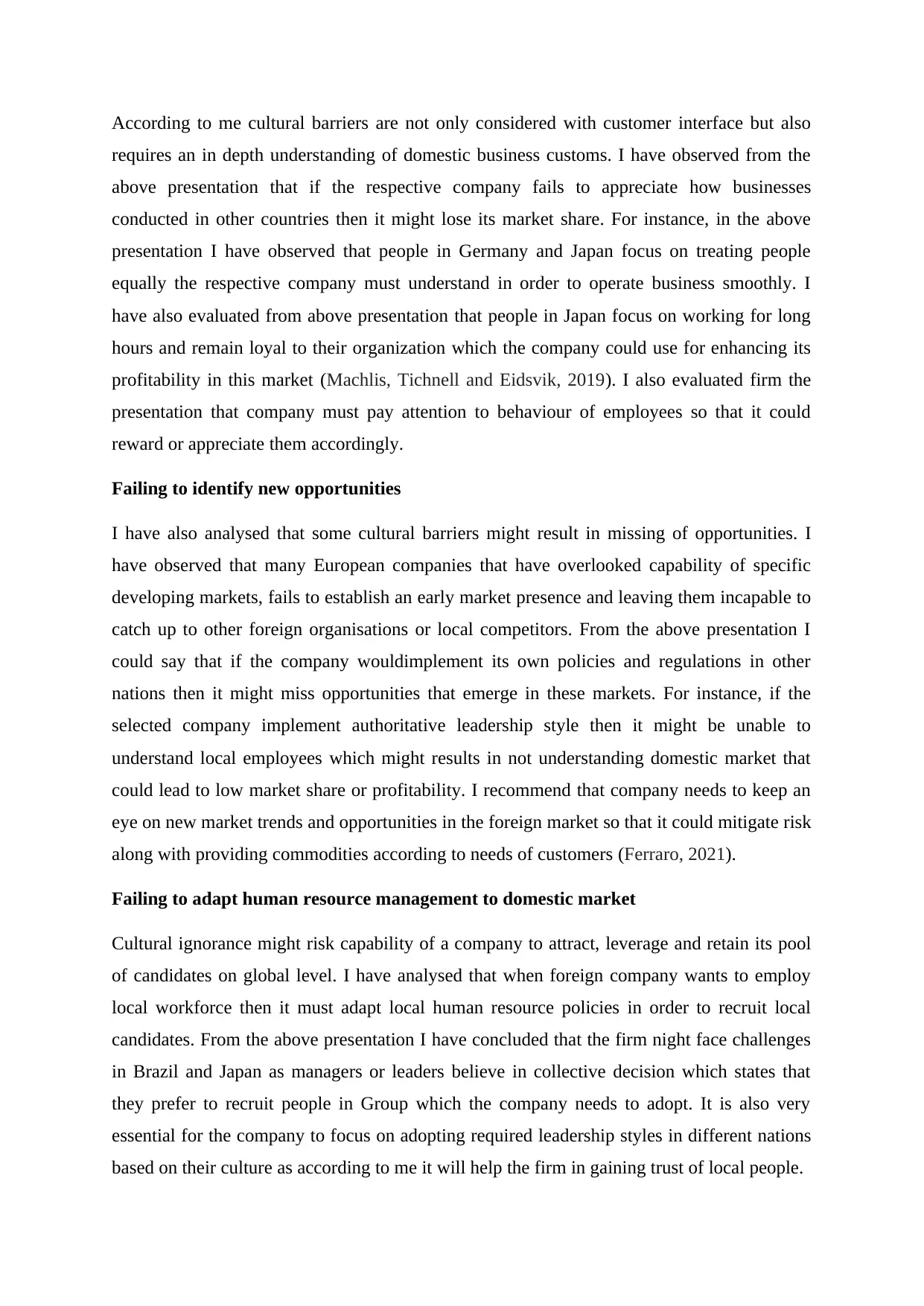
According to me cultural barriers are not only considered with customer interface but also
requires an in depth understanding of domestic business customs. I have observed from the
above presentation that if the respective company fails to appreciate how businesses
conducted in other countries then it might lose its market share. For instance, in the above
presentation I have observed that people in Germany and Japan focus on treating people
equally the respective company must understand in order to operate business smoothly. I
have also evaluated from above presentation that people in Japan focus on working for long
hours and remain loyal to their organization which the company could use for enhancing its
profitability in this market (Machlis, Tichnell and Eidsvik, 2019). I also evaluated firm the
presentation that company must pay attention to behaviour of employees so that it could
reward or appreciate them accordingly.
Failing to identify new opportunities
I have also analysed that some cultural barriers might result in missing of opportunities. I
have observed that many European companies that have overlooked capability of specific
developing markets, fails to establish an early market presence and leaving them incapable to
catch up to other foreign organisations or local competitors. From the above presentation I
could say that if the company wouldimplement its own policies and regulations in other
nations then it might miss opportunities that emerge in these markets. For instance, if the
selected company implement authoritative leadership style then it might be unable to
understand local employees which might results in not understanding domestic market that
could lead to low market share or profitability. I recommend that company needs to keep an
eye on new market trends and opportunities in the foreign market so that it could mitigate risk
along with providing commodities according to needs of customers (Ferraro, 2021).
Failing to adapt human resource management to domestic market
Cultural ignorance might risk capability of a company to attract, leverage and retain its pool
of candidates on global level. I have analysed that when foreign company wants to employ
local workforce then it must adapt local human resource policies in order to recruit local
candidates. From the above presentation I have concluded that the firm night face challenges
in Brazil and Japan as managers or leaders believe in collective decision which states that
they prefer to recruit people in Group which the company needs to adopt. It is also very
essential for the company to focus on adopting required leadership styles in different nations
based on their culture as according to me it will help the firm in gaining trust of local people.
requires an in depth understanding of domestic business customs. I have observed from the
above presentation that if the respective company fails to appreciate how businesses
conducted in other countries then it might lose its market share. For instance, in the above
presentation I have observed that people in Germany and Japan focus on treating people
equally the respective company must understand in order to operate business smoothly. I
have also evaluated from above presentation that people in Japan focus on working for long
hours and remain loyal to their organization which the company could use for enhancing its
profitability in this market (Machlis, Tichnell and Eidsvik, 2019). I also evaluated firm the
presentation that company must pay attention to behaviour of employees so that it could
reward or appreciate them accordingly.
Failing to identify new opportunities
I have also analysed that some cultural barriers might result in missing of opportunities. I
have observed that many European companies that have overlooked capability of specific
developing markets, fails to establish an early market presence and leaving them incapable to
catch up to other foreign organisations or local competitors. From the above presentation I
could say that if the company wouldimplement its own policies and regulations in other
nations then it might miss opportunities that emerge in these markets. For instance, if the
selected company implement authoritative leadership style then it might be unable to
understand local employees which might results in not understanding domestic market that
could lead to low market share or profitability. I recommend that company needs to keep an
eye on new market trends and opportunities in the foreign market so that it could mitigate risk
along with providing commodities according to needs of customers (Ferraro, 2021).
Failing to adapt human resource management to domestic market
Cultural ignorance might risk capability of a company to attract, leverage and retain its pool
of candidates on global level. I have analysed that when foreign company wants to employ
local workforce then it must adapt local human resource policies in order to recruit local
candidates. From the above presentation I have concluded that the firm night face challenges
in Brazil and Japan as managers or leaders believe in collective decision which states that
they prefer to recruit people in Group which the company needs to adopt. It is also very
essential for the company to focus on adopting required leadership styles in different nations
based on their culture as according to me it will help the firm in gaining trust of local people.
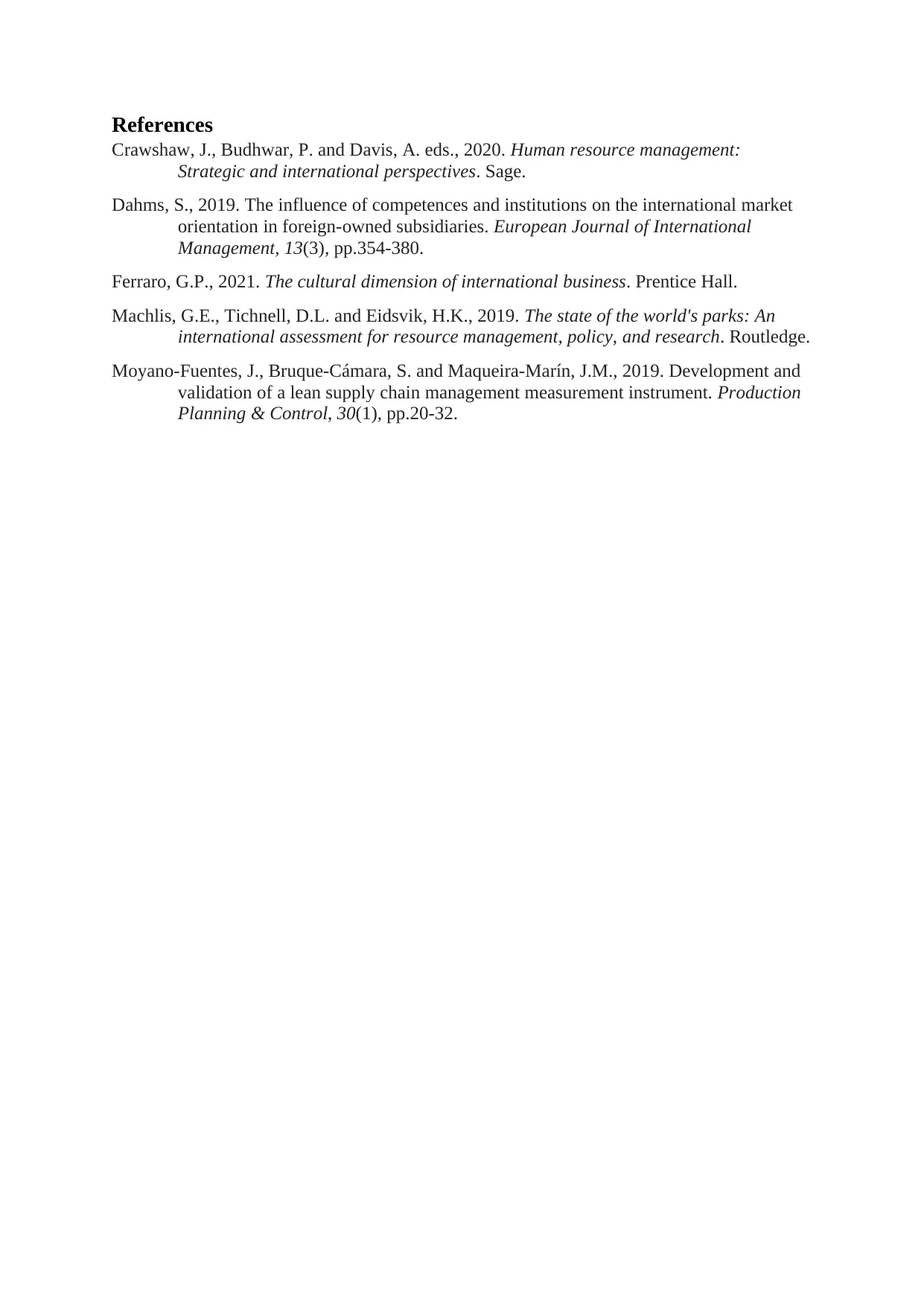
References
Crawshaw, J., Budhwar, P. and Davis, A. eds., 2020. Human resource management:
Strategic and international perspectives. Sage.
Dahms, S., 2019. The influence of competences and institutions on the international market
orientation in foreign-owned subsidiaries. European Journal of International
Management, 13(3), pp.354-380.
Ferraro, G.P., 2021. The cultural dimension of international business. Prentice Hall.
Machlis, G.E., Tichnell, D.L. and Eidsvik, H.K., 2019. The state of the world's parks: An
international assessment for resource management, policy, and research. Routledge.
Moyano-Fuentes, J., Bruque-Cámara, S. and Maqueira-Marín, J.M., 2019. Development and
validation of a lean supply chain management measurement instrument. Production
Planning & Control, 30(1), pp.20-32.
Crawshaw, J., Budhwar, P. and Davis, A. eds., 2020. Human resource management:
Strategic and international perspectives. Sage.
Dahms, S., 2019. The influence of competences and institutions on the international market
orientation in foreign-owned subsidiaries. European Journal of International
Management, 13(3), pp.354-380.
Ferraro, G.P., 2021. The cultural dimension of international business. Prentice Hall.
Machlis, G.E., Tichnell, D.L. and Eidsvik, H.K., 2019. The state of the world's parks: An
international assessment for resource management, policy, and research. Routledge.
Moyano-Fuentes, J., Bruque-Cámara, S. and Maqueira-Marín, J.M., 2019. Development and
validation of a lean supply chain management measurement instrument. Production
Planning & Control, 30(1), pp.20-32.
1 out of 12
Related Documents
Your All-in-One AI-Powered Toolkit for Academic Success.
+13062052269
info@desklib.com
Available 24*7 on WhatsApp / Email
![[object Object]](/_next/static/media/star-bottom.7253800d.svg)
Unlock your academic potential
© 2024 | Zucol Services PVT LTD | All rights reserved.




